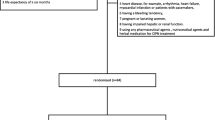Abstract
Objective
To evaluate the effects of wrist-ankle acupuncture combined with ginger moxibustion against gastrointestinal tract reactions (nausea, vomiting, and constipation) to chemotherapy in cancer patients.
Methods
A total of 60 patients with gynecological tumors treated by chemotherapy were randomly divided into two groups. The treatment group (30 cases) underwent wrist-ankle acupuncture and ginger moxibustion, whereas tropisetron hydrochloride and dexamethasone were intravenously administered to the control group (30 cases) during chemotherapy.
Results
The frequency of nausea in the treatment group was significantly less than that of the control group from the 2nd to the 5th day of chemotherapy (P<0.01). The anti-emetic effect in the treatment group was significantly better than that in the control group on the 3rd day of therapy (P<0.05). The incidence rate of constipation was significantly lower in the treatment group than that in the control group (P<0.01). Furthermore, the cost of therapy for the treatment group was significantly lower than that of the control group (P<0.01). Only 1 patient manifested a post-acupuncture side effect in the form of subcutaneous blood stasis.
Conclusion
Wrist-ankle acupuncture combined with ginger moxibustion could prevent gastrointestinal tract reactions to chemotherapy in cancer patients. In addition, the proposed method had fewer side effects, lower cost, and less risk.
Similar content being viewed by others
References
He BB, Sun SH. Current therapy for women with recurrent ovarian cancer. J Pract Med 2010;26:1280–1281.
Qiu P, Shen X. The research progress of reducing vomiting reaction induced by chemotherapy with Chinese medicine. Yunnan J Tradit Chin Med Mater Med (Chin) 2012;33(6):72–73.
Liu FB, Hou ZK, Yang YY, Zhang ZZ, Xie D, Xie N, et al. Literature review and analysis of the development of health outcomes assessment instruments in Chinese medicine. J Integr Med 2013;1:80–89.
Shu S, Li TM, Fang FF, He HL, Zhou QH, Gu W, et al. Relieving pre-exam anxiety syndrome with wrist-ankle acupuncture: a randomized controlled trial. J Chin Integr Med (Chin) 2011;9:605–610.
Zhang XS, ed. Wrist-ankle acupuncture. 3rd ed. Beijing: People's Military Medical Press; 1997:133–137.
Shi XM, ed. Science of acupuncture and moxibustion. 2nd ed. Beijing: China Traditional Medicine Press; 2009:154–155.
Cheng CW, Fu SF, Zhou QH, Wu TX, Shang HC, Tang XD, et al. Extending the CONSORT Statement to moxibustion. J Integr Med 2013;11:54–63.
Cupissol DR, Serrou B, Caubel M. The efficacy of granisetron as a prophylactic anti-emetic and intervention agent in high-dose cisplatin-induced emesis. Eur J Cancer 1990;26(Suppl1):S23–S27.
Rossman DA. The functional gastrointestinal disorders and the Rome? process. Gastroenterol 2006;130:1377–1390.
Roila F, Hesketh PJ, Herrstedt J. Prevention of chemotherapy-and radiotherapy-induced emesis: results of the 2004 Perugia International Antiemetic Consensus Conference. Ann Oncol 2006;17:20–28.
Wang WL, Shen WD. A summary of studies in countries other than China on acupuncture in anesthesia and for postoperative complications. J Chin Integr Med (Chin) 2009;7:797–799.
Dobos GJ, Kirschbaum B, Choi KE. The Western model of integrative oncology—the contribution of chinese medicine. Chin J Integr Med 2012;18:643–651.
Dabaghzadeh F, Khalili H, Dashti-Khavidaki S, Abbasian L, Moeinifard A. Ginger for prevention of antiretroviral-induced nausea and vomiting: a randomized clinical trial. Expert Opin Drug Saf 2014;13:859–66.
National Comprehensive Cancer Network (NCCN) Clinical Practice Guidelines in Oncology. Antiemesis.V.4.2009. USA Washington: National Comprehensive Cancer Network; 2009: AE.7.
Author information
Authors and Affiliations
Corresponding author
Additional information
Supported by the National Natural Science Foundation of China (No. 81202963), the Foundation of Changhai Hospital (No. CH125542900), and the Nursing Foundation of Changhai Hospital (No. 2012HL005)
Rights and permissions
About this article
Cite this article
Liu, Yq., Sun, S., Dong, Hj. et al. Wrist-ankle acupuncture and ginger moxibustion for preventing gastrointestinal reactions to chemotherapy: A randomized controlled trial. Chin. J. Integr. Med. 21, 697–702 (2015). https://doi.org/10.1007/s11655-014-2009-x
Received:
Published:
Issue Date:
DOI: https://doi.org/10.1007/s11655-014-2009-x




